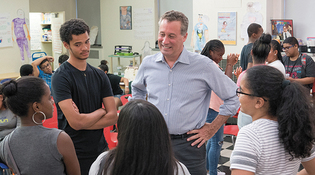 loading
loading
Where They Are Now"No one thought a library would change."Tony Marx '81 ran Amherst College. Now he runs the New York Public Library. This interview has been condensed and edited.  The New York Public Library/Jonathan BlancAs president of the New York Public Library, Tony Marx ’81 oversees the largest branch-library system in the country. View full imageTony Marx ’81 is presidential material. After graduating from Yale, he researched student internships for Yale president Bart Giamatti ’60, ’64PhD. Then he became an intern himself, in the office of the president of the University of Pennsylvania. Following graduate school and a tenured professorship in political science at Columbia, he was president of Amherst College from 2003 to 2011, and now he is at the New York Public Library in a certain position. Guess which. A dad of two, he also holds an MA, MPA, and PhD from Princeton, which is a lot of orange and black for this publication, but sometimes that’s how it goes. Yale Alumni Magazine: President of the New York Public Library. What was your favorite library at Yale? Tony Marx: The L&B room at Sterling felt like a place where you’d died and gone to heaven. Y: Maybe that’s because everyone was asleep. M: I took the occasional nap, I’ll confess that much. There was one guy who came regularly for a nap at lunchtime who’d been working on the Ben Franklin papers forever. He was finishing, I don’t know, the 35th volume. It’s amusing since now my office has the original portrait that the $100 bill was based on. Y: You transferred to Yale as a junior from Wesleyan. Why? M: I got very involved in student politics around the issue of South Africa and ended up a sophomore chairing a trustee committee on divestment. As I was becoming very serious about political science, I noticed the Yale poli sci department was the best in the world. Y: It seems you took your political involvement to a new level after college. M: I decided if there ever was a moment when I’d be free to have an adventure, this was it. A friend introduced me to the leader of the major education NGO in South Africa, and he said, “If you can find yourself a way over, we’ll find you something useful to do.” I found myself in the country I’d been yelling and screaming about, but knew almost nothing about. I spent that first year helping to plan and fund-raise for a [residential] school that took South African students who’d been purposely undereducated during apartheid and gave them one year of quality education. Y: Wow! And you did something kind of similar when you became Amherst’s president in 2003. When you got there, almost 14 percent of the students received Pell Grants, and when you left, it was over 17 percent. M: A lot of people with great potential are left behind. I had seen that in South Africa, so I was concerned to see just how privileged a cohort Amherst and its peers were drawing from disproportionately. And then I started reading about the history of the college and the charter says, “to train the indigent.” Y: Making education accessible to those who might not get it. Sounds like the idea behind the public library. M: The public libraries of New York get close to 40 million visits a year, which is more than all the museums and sporting teams combined. It’s the largest branch-library system in America. We serve everyone from the Nobel Laureate to the illiterate. My days take me to the Bronx or Staten Island—the South Bronx is the poorest congressional district in the US. Y: But aren’t libraries sort of relics from a bygone era? M: The libraries there are bursting with life! No one ever thought a library would change, and as a result there’s no constraints on them. We get to rethink how to make them ever more powerful. The libraries are committed to moving everyone forward from where they started. People come for quiet, for heating, for air conditioning. They come for computers, because a quarter of the city can’t afford broadband at home. We are the largest free provider of computer skills up through coding. The library is the only place all of us in our differences sit together. Y: The only place? Really? M: Except for the subway.
The comment period has expired.
|
|